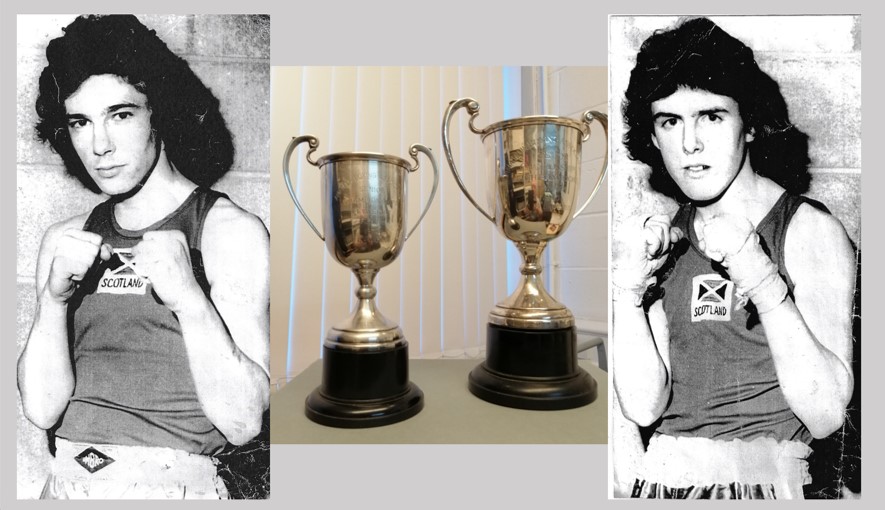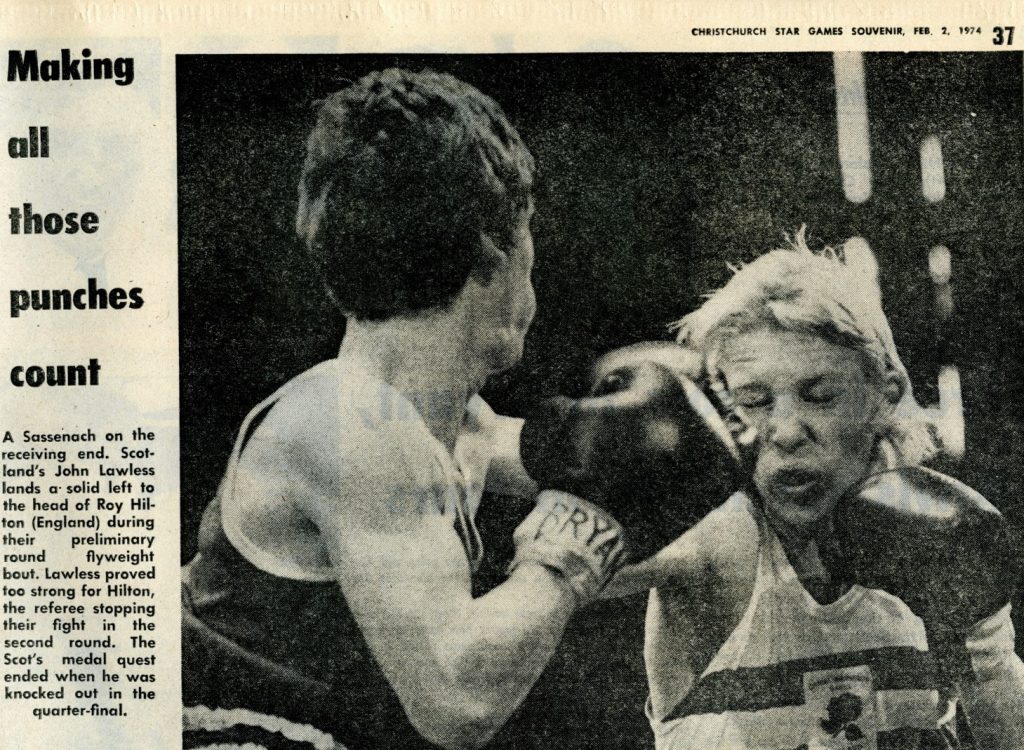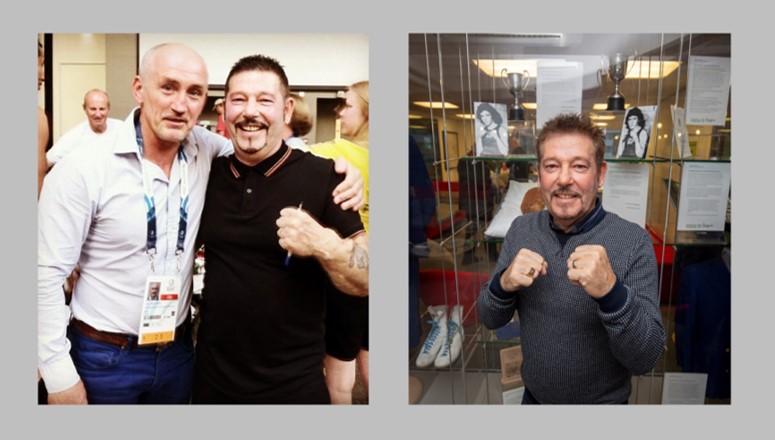ABA Trophies 1974 & 1975

Scotland’s sporting history has a rich heritage of boxing siblings. While it was rare for the siblings to be in the same Scotland national team it did happen on a number of occasions – Tom and Mike Imrie in the 1960s and Drew and Wilson Docherty in the 1980s readily come to mind. In the 1970s this was the scenario for John and Martin Lawless who, just like the Imrie and Docherty siblings, boxed at different weights.
It was during the 1960s that John and Martin joined Grangemouth Amateur Boxing Club with a group of friends. The coaches quickly identified that the brothers were talented boxers and encouraged them to continue to attend as their friends began to drift away. It was a turning point in their young lives.
Boxing became our focus and we developed different styles of Boxing. I was described as a pocket Battleship. He [Martin] was a stylist, and had a unique punching style.
John Lawless, 2019
As juniors the Lawless brothers enjoyed success at District and National level. They were regularly featured not only in the local media (Falkirk Herald and Grangemouth Advertiser) but also in the national press (Edinburgh Evening News and Glasgow Evening Times). As youths, John claimed the first major Scottish national trophy (which would later become a regular feature in the Lawless household) when he won the Scottish Youth Championship in 1969 at the Bells Sports Centre in Perth. Martin would repeat this feat the following year. It was becoming a case of anything you can do I can do better. The brothers often boxed against each other in sparring and in exhibition matches. John found this a very frustrating experience.
When we boxed in exhibition bouts at club shows it sometimes got out of hand and we were warned by the refs. I blamed Martin for it because of his style. He was a master boxer, a fast mover and had a unique punching style. It was when we were sparring that he would hit too hard and we would fall out about it.
John Lawless, 2019
In 1973 John progressed to the senior ranks and was quickly making a name for himself. District and international recognition soon followed. Martin was also allowed to progress to the senior ranks despite only being 16 years old. Such was his talent there were no viable opponents of his age in Scotland at the time.
Martin was given consent by the Scottish Amateur Boxing Association to move up. This made it more difficult for me, as I had to move up a division so that we weren’t competing against each other.
John Lawless, 2019
The 26th September 1973 was a momentous moment in Johns career. The Scottish Amateur Boxing Association held a box-off to select the seven boxers who would represent Scotland at the 1974 Commonwealth Games in Christchurch, New Zealand. John defeated J. Douglas the reigning Scottish flyweight champion and won his place on the team. Martin at this time was too young to be considered. At the Games John reached the quarter-finals, just missing out on a medal. He regards the competition as one of the highlights of his career.

1974 was a major year for both brothers. Martin won the Scottish light-flyweight title while John was runner-up to Billy Strawb in the Scottish flyweight final. Strawb was unavailable for the ABA Championships so John was selected in his place. At the ABA championships qualifiers both John and Martin won their bouts to become the first Scottish brothers to box in the ABA Semi-finals in the same year. The Semi-finals were held at Bellevue, Manchester, Martin was drawn against England’s Charlie Magri, John was drawn against John McEwan of England. Martin lost his semi-final, while John won through to the final. It wasn’t to be a happy ending for John as he lost to Maurice O’Sullivan of Wales.
Losing in the final to O’Sullivan was the biggest disappointment of my career, but to have reached the final was a great achievement.
John Lawless, 2019
Some Scottish boxing reporters at the finals felt that quite a few Scottish boxers came up against some very biased judging from the officials. Indeed the reporter from the Glasgow Evening Times wondered if it was worth the time and effort of Scottish boxers going to the championships.
1975 was to be the year that Martin finally eclipsed his elder brother’s achievements, going one better than John and winning the Senior ABA light-flyweight championship, defeating Robert Robinson of England in the final. He is (to date) the only Scot to have won this title.
As a result of his success, Martin was selected to train with the Great Britain Olympic Boxing Team for the 1976 Montreal Games.
In 1975 John and Martin were both selected for the Scotland Team that went to the European Boxing Championships in Katowice, Poland. John lost in the first round to the title favourite Constantin Gruiescu of Romania. Martin reached the quarter-final losing to Spain’s Enrique Cal Rodriguez, and missed out on a medal which would have been a great achievement for the 18-year-old.
1976 was to be a turning point for both brothers. John added further international honours when he was named captain of the Scottish team to face England in January 1976. However, Martin had become disillusioned with boxing, and in 1976, he pulled out of the Great Britain Olympic Squad.
1977 saw John begin to question his enthusiasm for the sport as he was struggling with injury. He had recently moved up to bantamweight but had to withdraw from an international match in Denmark. He also missed out on the Scottish championships and was overlooked by the national selectors for the European Championships. Martin on the other hand had made a comeback to boxing and won another Scottish championship title, this time at flyweight. He was back in the Scotland team for the 1977 European Championships in Halle, East Germany. Martin again missed out on a medal when he lost in the quarter-finals to Plamen Kamburov of Bulgaria.
Martin decided to retire from Boxing in 1977, with brother John also deciding to take a break from the sport.
I think that because I had achieved so much so early in my career it had left me a bit jaded.
John Lawless, 2019.
John made a comeback as a bantamweight in 1978. One of his early comeback matches was at the Inchyra Grange Hotel, Grangemouth. It was an exhibition bout against a young Barry McGuigan who won gold for Northern Ireland at the 1978 Commonwealth Games aged 17.
I fancied my chances against him but he beat me quite easily. I met up with Barry again in a restaurant at the Glasgow 2014 Commonwealth Games. I got my picture taken with him
John Lawless, 2019

For the next decade John continued to box with injuries and breaks from the sport affecting his career in the ring. Like all amateurs he hoped to fight at the Olympics. However his attempts to reach the Los Angeles Games in 1984 were unsuccessful.
When I came back I was fitter and stronger. My only regret from my career was not being able to achieve my Olympic Games dream.
John Lawless, 2019
In 1990 at the age of 34 John retired from boxing. There was to be a final feature of Johns career that he is extremely proud of. The Great Britain boxing coach Kevin Hickey produced a boxing manual called Better Boxing. There is a section in the book about how to use the jab and it features a picture from the Scotland v England match in 1975 of John catching Charlie Magri of England with a perfect left Jab.
When you’re younger you don’t have any regrets about the decisions you made about taking a break from sport because you have other things to do. However, now when I look back, I do regret taking these breaks because although I came back stronger and fitter, so were my opponents and when I suffered an injury I took longer to heal. However, I did enjoy my career and I boxed against some of the greats of British boxing, Dave Larmor of Ireland, Charlie Magri, Johnny Owens and Barry McGuigan.
John Lawless, 2019